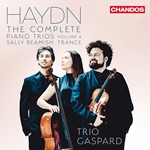Franz Joseph Haydn
Franz Joseph Haydn (31 March 1732 – 31 May 1809)
Various musical paternity charges have been levelled at the composer Franz Joseph Haydn. His career coincided with the development of Classical style and forms (the symphony, sonata, string quartet and other instrumental forms), in the moulding of which he played an important part. Born in Rohrau in 1732, the son of a wheelwright, he was trained as a chorister at St Stephen’s Cathedral in Vienna, where he made his early living before his appointment to the small musical establishment of Count Morzin in 1759. In 1760 he entered the service of the Esterházy Princes, and he succeeded to the position of Kapellmeister on the death of his predecessor and immediate superior Gregor Werner in 1766. Much of Haydn’s life now centred on the magnificent palace and estate at Eszterháza, where his employer Prince Nikolaus Esterházy had moved his entourage for most of the year. The death of the Prince in 1790 released Haydn and allowed travel to London. There followed further service to the successors of Prince Nikolaus, now at the former residence at Eisenstadt, until his retirement in Vienna, where he died in 1809, as the soldiers of Napoleon again entered the city.














 My Wish List
My Wish List














